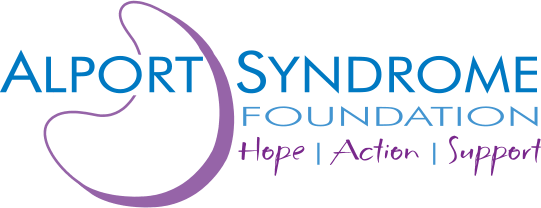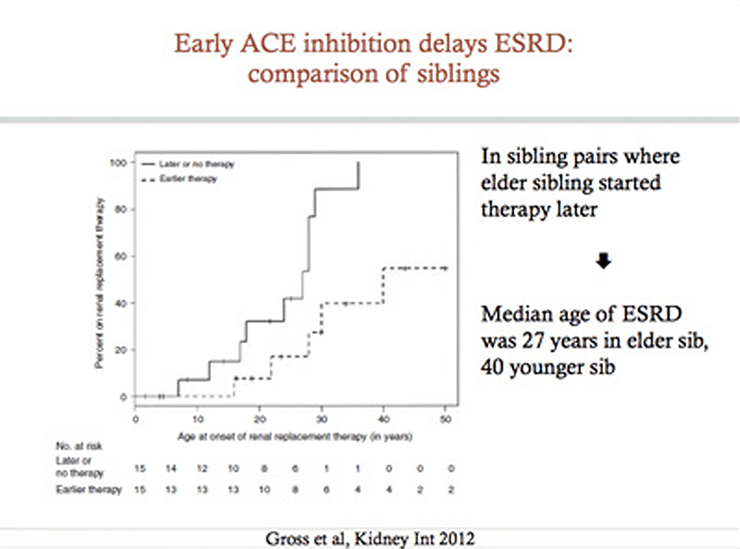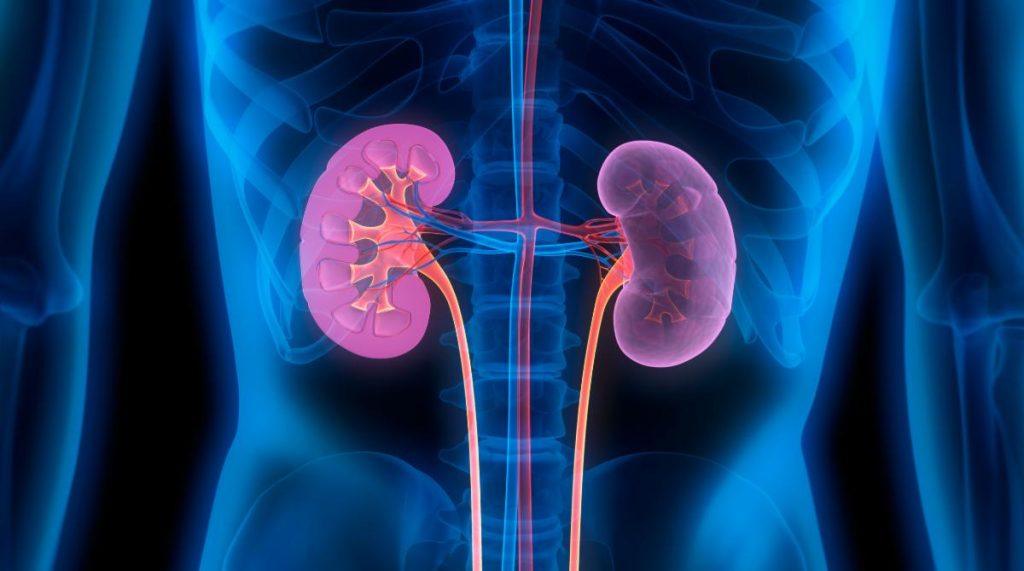Common Alport treatment medications currently include:
Angiotensin converting enzyme
(ACE) inhibitors — these medications block the production of angiotensin II, the active form of angiotensin
Angiotensin receptor blockers
(ARBs) — these medications block the action of angiotensin II
Sodium-glucose Cotransporter-2 inhibitors
(SGLT2 inhibitors) — While not specifically studied in Alport patients, one of these drugs, Farxiga, is FDA approved for CKD treatment in adults.
The recommended medications for treatment of Alport syndrome interfere with several hormones that together make up what is known as the renin-angiotensin- aldosterone system, or RAAS. The RAAS normally plays a very important role in maintaining the body’s fluid balance and blood pressure, helping to make sure that the kidneys get the blood flow necessary for good kidney function. The RAAS is overactive in various chronic kidney diseases, including Alport syndrome, and has been shown to promote scarring of the kidneys. Medications that interfere with RAAS hormones, such as ACEs and ARBs (more details below), protect kidney function in animals and people with chronic kidney diseases.
An additional type of medication, SGLT2 inhibitors, have been shown to decrease the risk of kidney failure, heart attacks, and death in patients with diabetes. While they have not been studied specifically in patients with Alport syndrome, they are increasingly being used in addition to ACEs/ARBs in adult Alport patients to help reduce the risk of kidney failure. Learn more about SGLT2 inhibitors further down this page.
Scroll to the bottom of this page for pediatric-specific medication information.
ACE & ARBS
Both ACE inhibitors and ARBs have been shown to slow down the loss of kidney function in mice with Alport syndrome. People who start taking an ACE inhibitor while their kidney function is still normal are older when they develop kidney failure than Alport patients who don’t receive ACE inhibitors or are started on ACE inhibitors after they have started to lose kidney function. ACE inhibitors, ARBs, and aldosterone inhibitors all reduce elevated urine protein levels in people with Alport syndrome.
Researchers are still learning about the ways in which ACE/ARB medications protect the kidneys of animals and people with Alport syndrome. Researchers believe there are at least two effects. First, these medications may directly prevent the formation of scar tissue in kidneys of animals and people with Alport syndrome. Second, by lowering urine protein levels these medications may prevent the harmful effects of high urine protein levels on kidney cells. These medications have relatively few and minor side effects, they are not expensive and they have been used safely in many children with kidney disease.
ACE inhibitors that have been used to treat Alport syndrome patients include, but are not limited to:
ARBs that have been used to treat Alport syndrome patients include, but are not limited to:
Spironolactone is medication used for aldosterone inhibition.
ACE & ARB MONITORING
In addition to taking ACE inhibitors and/or ARBs to control proteinuria (protein in the urine), Alport syndrome patients need to control their blood pressure and be regularly monitored. Monitoring tests include urine and blood chemistry testing. As a general recommendation, patients with normal kidney function should be monitored yearly, patients with moderate kidney function should be monitored every 6 months, and those with advanced kidney disease/failure should be monitored every 1 to 3 months, or more frequently if directed by a medical professional.
ACE & ARB SIDE EFFECTS
Possible side effects from the use of ACE/ARBs include:
- Lightheadedness, especially upon standing up
- Elevated blood potassium levels, although not common in those who have normal kidney function
- Cough, specifically with the use of ACE inhibitors
- Injury to a developing fetus
Rare but serious side effects include:
- Allergic reactions
- Decrease in white blood cells
- Swelling of tissues (angioedema)
Pediatric Clinical Practice Recommendations
The Clinical Practice recommendations advise testing of urine protein levels in children with Alport syndrome, starting at 1 year of age and then at least annually. The test is called the urine protein creatinine ratio. Children with urine protein creatinine ratios above 0.2 should be treated with an ACE inhibitor with the goal of reducing the protein creatinine ratio as much as possible. This may require a gradual increase in the dose of the medication, and may be limited by side effects such as lightheadedness. If a child is receiving the maximum dose of the ACE inhibitor and still has high urine protein levels, the Clinical Practice recommendations suggest starting either an ARB or an aldosterone inhibitor (the choice is up to the child’s doctor).
In February 2021, Dr. Clifford Kashtan graciously prepared a layman’s summary of the November 2020 updated pediatric treatment recommendations. Click here to read Dr. Kashtan’s summary. PDF de las pautas de tratamiento pediátrico actualizadas del Dr. Kashtan.
Diagnosis in the older child enabled earlier diagnosis in the younger sibling, resulting in earlier therapy and delayed onset of ESRD by 13 years.
SGLT2i MEDICATIONS
While SGLT2 inhibitors have been shown to decrease the risk of kidney failure in patients with diabetes, recent data has also shown that these medications delay kidney failure in non-diabetic chronic kidney disease (CKD) patients. One of these medications, dapagliflozin (Farxiga), is now FDA approved for use in patients with CKD without diabetes who are at increased risk for progressing to kidney failure. Click here to read the FDA’s approval announcement. These medications reduce urine protein as well.
While they have not been studied specifically in patients with Alport syndrome, they are increasingly being used in addition to ACEs/ARBs in adult patients to help reduce the risk of kidney failure. As of June 2023, there is no clear consensus regarding initiation of SGLTI treatment in adult patients.
Learn more about SGLT2 inhibitors in our Adult Treatment Medications Guide.
SGLT2i SIDE EFFECTS
Overall, the vast majority of patients tolerate these medications well. However, as with most medications, there are some noted side effects to be aware of. These can include:
- Dehydration
- Genitourinary fungal infections
- Urinary tract infection
- Decrease in glomerular filtration rate (GFR)
- Ketoacidosis, especially in diabetic patients
SGLT2i DRUG INTERACTIONS
There are three main medications that should be avoided or reduced when taking an SGLT2i:
- Diabetic medications (eg, insulin, sulfonylureas, biguanides)
- Diuretics (eg, spironolactone, furosemide)
You should always speak with your doctor before making any dosage changes or stopping these medications.
Talking with Your Nephrologist About Medication Treatment Options
It’s important to establish an open dialogue with your nephrologist, where you feel comfortable voicing your questions and concerns. Part of this conversation, should revolve around any medications you and your doctor feel are needed. Ideally, you and your nephrologist should have a partnership in managing your care, as this will lead to the best outcomes. If you are uncomfortable or not sure how to open this line of communication, here are a few tips:
- Come prepared to your visit with a list of concerns and symptoms to discuss, as well as any questions you’d like to ask.
- Request to have your lab work done before your visit so that you’re able to discuss the results in detail during your appointment.
- Ask the doctor whether the findings in your lab results warrant a change to your current medications and why.
- If you’re an Alport patient who is not currently on the standard of care medication regimen, ask your doctor if it may be beneficial to place you on a nephroprotective medication, such as those discussed on this page. If they say no, ask them to explain their rationale so that you clearly understand their position.
- If your nephrologist isn’t aware of the standard of care for Alport treatment or the recent data around the use of SGLT2 inhibitors in non-diabetic CKD patients, you can direct them to the list of references on the right side of this page.
- Finally, if you and your doctor aren’t able to have an open, respectful line of communication, seek out another provider in your area, if possible. ASF may be able to recommend an Alport-familiar nephrologist near you. Contact us by email.
Scholarly References on Alport Treatment Medications
(listed in reverse chronological order)
- Treatment of Nondiabetic Kidney Diseases with Sodium-Glucose Cotransporter-2 Inhibitors
Brosius, Frank C.
CJASN, May 10, 2023. - Alport Syndrome: Clinical Spectrum and Therapeutic Advances
De Gregorio, Vanessa et al.
Kidney Medicine, March 21, 2023. - Sodium-Glucose Cotransporter-2 Inhibitors in Patients with Hereditary Podocytopathies, Alport Syndrome, and FSGS: A Case Series to Better Plan a Large-Scale Study
Jan Boeckhaus and Oliver Gross
Cells, July 18, 2021. - A Synopsis for Individuals and Families with Alport syndrome: Clinical Practice Recommendations for the Treatment of Alport Syndrome in Children, Adolescents and Young Adults – An Update for 2020
Kashtan, Clifford E.
February, 2021. - Clinical practice recommendations for the diagnosis and management of Alport syndrome in children, adolescents, and young adults–an update for 2020
Kashtan, Clifford E. and Gross, Oliver.
Pediatric Nephrology, November 6, 2020. - Dapagliflozin in Patients with Chronic Kidney Disease
Heerspink, Hiddo J.L. et.al.
The New England Journal of Medicine, October 8, 2020.
Patients with Alport syndrome should avoid drugs that are nephrotoxic (harmful to kidneys) and ototoxic (harmful to ears).
Nephrotoxicity: Always consult with your nephrologist about the safety of medications you may be taking (even common over-the-counter [OTC] drugs). Your nephrologist can provide guidance on medicines that should be avoided. Nephrotoxic drugs include OTC medicines such as
non-steroidal anti-inflammatory drugs (NSAIDs) containing aspirin, ibuprofen and naproxen, as well as some decongestants. Learn more about drugs that may be harmful to your kidneys on NKF’s website.
Ototoxicity: Information on ototoxic drugs can be found here. Hearing should be monitored by an audiologist every one to two years beginning in children, particularly boys, at 7 to 8 years of age and continued regularly. Hearing aids should be prescribed as needed.
Maintaining a healthy lifestyle and a balanced diet is also beneficial. Discussion of nutritional considerations, such as sodium reduction and moderating protein consumption, should be discussed with your doctor.




